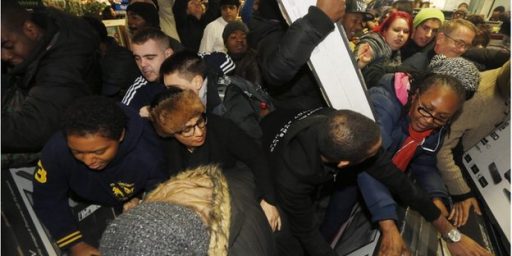63 Dead In Baghdad Bombings
Less than a week after American forces finally vacated the country, Iraq looks to be returning to form:
BAGHDAD — A wave of coordinated explosions ripped across Baghdad early on Thursday, killing at least 63 people, wounding more than 180 and jolting a country already unsettled by a deepening political crisis and the absence of American troops.
Using car bombs and improvised explosive devices, insurgents attacked markets, grocery stores, schools and government buildings in a dozen neighborhoods in central and eastern part of the capital.
The attacks marked the most significant violence in Iraq since the last American troops pulled out of the country earlier this week. So far, the withdrawal and the bitter fighting between Prime Minister Nuri Kamal al-Maliki, a Shiite, and his political foes in Parliament have not been accompanied by a rise in violence. But Thursday’s attacks raised the specter that the crisis inside the government could spill into the streets.
The attacks came a day after Mr. Maliki threatened to abandon an American-backed power-sharing government created a year ago. The prime minister’s words at a televised news conference on Wednesday threw a fragile democracy into further turmoil after the departure of American troops, potentially tarnishing what has been cast as a major foreign policy achievement for President Obama.
There was no immediate claim of responsibility for the attacks on Thursday but they appeared similar to others conducted by the insurgent group, Al Qaeda in Iraq, which has tried to plunge the country back into a sectarian war by pitting Sunnis and Shiites against each other.
“This has nothing to do with the American withdrawal,” said Abdul Kareem Thirib, the head of the security committee for Baghdad’s provincial council. “When they were here, there were also explosions. We were the ones in control of the streets when the Americans were here. I think there will be more cowardly attacks in the coming days but we will face them and everything will be under control.”
He added, “They are trying to send a message to say that ‘we are still here.'”
The attacks began around 6:30 a.m. as Iraqis were leaving for work and blasted apart stores just as shopkeepers were opening their metal gates.
The most deadly attack occurred in the bustling neighborhood of Karada where a car bomb aimed at offices for the government’s integrity committee killed 13 people and wounded 36. Medics and volunteers at the scene did not have enough stretchers for the wounded and dead so they slung bleeding bodies into blankets. Nearby apartment buildings were ripped apart and store windows were shattered as far as 10 blocks from the blast site.
One woman hobbled to the hospital on bloodied legs. When a man assisting her urged her into an ambulance, she said, “I don’t want anything from the government.”
A woman who had been searching for her son in the rubble of one blast learned of his death at the Ibn al-nafiz hospital in Karada. “My God, my God,” she screamed, running out of the emergency room.
Ali Suhail, 43, was opening his gleaming new electronics shop for the very first time when the explosion hurled him to the ground and destroyed an investment years in the making.
“Everybody has a dream — you need to open a store to achieve it,” he said, standing on a heap of broken glass. “Now I have a new dream: to leave this country.”
If this is the New Iraq, then one thinks Mr. Suhail won’t be the only person having that thought.





Who cares? The U.S. has washed its hands of Iraq and President Obama ran on a platform in 2008 stating that the U.S. should not care about what happens in Iraq.
My guess in that the U.S. will soon be out of Afghanistan and a few wonk wannabes will be posting about the tribal warfare in Afghanistan and that they U.S. will not care any more about Afghanistan than it cares about Iraq.
What is odd is that the Obama Administration is basically implementing the foreign policy promoted by Ron Paul.
@superdestroyer:
Getting out of Iraq, along with killing bin Laden, are two things that this President has done that I support 100%
President Obama ran on a platform in 2008 stating that the U.S. should not care about what happens in Iraq.
I know this is pointless, but please support your claim.
My guess in that the U.S. will soon be out of Afghanistan and a few wonk wannabes will be posting about the tribal warfare in Afghanistan and that they U.S. will not care any more about Afghanistan than it cares about Iraq.
Pakistan and terrorism are far greater concerns in Afghanistan than tribal warfare.
What is odd is that the Obama Administration is basically implementing the foreign policy promoted by Ron Paul.
Muammar Gaddafi would strongly disagree.
Another tree of liberty planted and watered with the blood of
patriotsother people’s children (I fixed this one myself).Laissez les bon temps roullez! Now lets elect President Romney or Gingrich so that we can plant the tree of liberty somewhere else. There must be children we haven’t killed–someplace or another.
The die was cast the moment Bush attacked Iraq. The only winner was going to be Iran.
Oh, and Halliburton and assorted defense contractors…
@anjin-san: and Blackwater/Xi and a host of other private companies. The war was a huge boon for a lot of people, unfortunately the war was to the detriment of a lot of others like the citizens of the US, the military, our reputation abroad, little things like that.